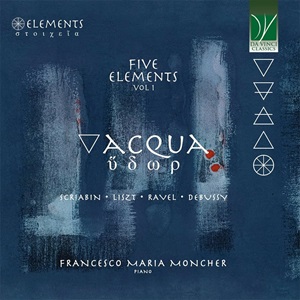
Five Elements Vol.1: Acqua
Alexander Scriabin (1872-1915)
Piano Sonata No 2, Op 19
Franz Liszt (1811-1886)
Les Jeux d’Eaux à la Villa D’Este
Maurice Ravel (1875-1937)
Jeux d’Eaux
Une Barque sur l’Océan
Ondine
Claude Debussy (1862-1918)
La Cathédrale Engloutie
Reflets dans l’Eau
L’Isle Joyeuse
Francesco Maria Moncher (piano)
rec. 2023, DV Studio Cigole (BS), Italy
Reviewed as a digital download from a press preview
Da Vinci Classics C00821 [62]
I’m not sure whether this impressive collection is Francesco Maria Moncher’s solo debut recording. My apologies if he has an ample discography that I have been unable to track down- but it certainly feels like the work of a tyro determined to make a name for himself. In a world in which every pianist seems to be capable of making the Liszt Transcendental Études sound like scales and arpeggios, Moncher’s ferocious and fearless technical ability stands out. The works he has chosen for this first disc in a series devoted to each of the traditional elements, this one is water, are some of the most fearsome in the repertoire. And Moncher sounds like he eats them for breakfast.
The thematic programme has an extremely chequered history on disc, but this one is uncommonly well-chosen – neither too obvious nor too obscure, substantial without being overly earnest and stodgy. It is heavily slanted towards French music, which is no problem when the pianist in question clearly possesses considerable flair for that part of repertoire.
Before going any further with this review, it must be said that the sound quality on this Da Vinci release isn’t up to the standards of the piano playing it records. It is rather hard and brittle, making Moncher’s playing sound more unsubtle than I suspect it was in the flesh. It certainly isn’t up to the finest modern standards, which is a great pity because this alone keeps me from awarding top accolades to a disc which is musically a delight.
Recording quality aside, I suspect that Moncher is a pretty forthright piano player. These are not delicate perfumed miniatures but full-blooded virtuoso show-pieces. Combined with that noisy piano sound, some of these works lack subtlety but make up for that lack with brilliance and dazzling risk taking. The sea that surges through these pieces is an elemental force. Even the normally placid Ravel Barque rises and falls on a mighty tidal swell. It leaves Bruce Liu’s much more high profile version on DG in the shade – further evidence that Moncher has what it takes to compete at the top level.
This Ondine is no decorous mermaid, but as treacherous and bewitching as the sea itself. Moncher certainly out does Behzod Abduraimov in his much admired recent version, making him sound almost hesitant at the torrential climax by comparison.
Even the allegedly more domesticated waters of the two Jeux D’Eaux included (by Liszt and Ravel respectively) present awesome rather than merely decorative sights. There isn’t a lot that is spiritual about these Lisztian waters as one finds in Brendel’s famous version – this is more a fountain as conceived by Horowitz, all steel fingers and neurotic energy.
Not exactly helped by the recording, Moncher’s Debussy is similarly muscular. Listening to the BBC archives release from ICA, I was surprised to hear how similarly robust Michelangeli’s Debussy was live. In something like La Cathédrale Engloutie, Moncher’s dominant pianism produces a suitably overwhelming effect. There is no getting around the fact that Reflets dans l’Eau suffers from a combination of rough and ready sound and a much less limpid approach than, say, Seong-Jin Cho on DG. Moncher’s approach is more étude-like than evocative.
Only in the final piece of all, Debussy’s L’Isle Joyeuse, does Moncher overstep the mark. This is more an amphibious D-Day landing than an impressionist seascape, but my God are the final pages exciting!
This is a splendid recital cruelly hampered by its engineering. I keenly anticipate the next instalment, but with a plea in the name of all that’s holy that the man gets given better sound!
David McDade
Buying this recording via a link below generates revenue for MWI and helps us keep free access to the site



















